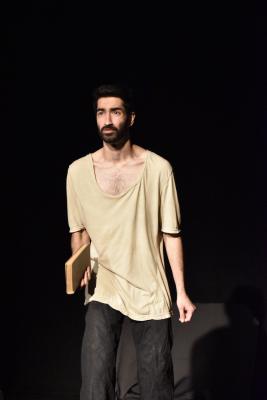At John Cabot, a very un-American Spoon River

Adapting Edgar Lee Masters’ 1915 Spoon River Anthology into the English Theatre of Rome’s 90-minute production, which ran for 10 inventive shows produced by Gaby Ford at John Cabot University was, said adapter-director Irina Tsoutos, “just a bit of a job.”
That seems an understatement.
For the same reason that it is beloved by drama school applicants, Masters’ Spoon River is notoriously difficult to adapt for the stage. The anthology paints the portrait of a fictional small town via 244 free-verse monologues, delivered by the 212 separate occupants of the local cemetery.
Masters dreamed up so many — and such a diverse, richly detailed group of —characters that a 1916 issue of the Journal of Abnormal Psychology “strongly” recommended his anthology to “the psychologist of the normal or the abnormal, to the criminologist, to the sociologist, to the humanitarian, to him who is interested in characterology.”
That breadth makes for rich reading. But without a thoughtful pair of trimming shears, it makes for jumbled theatre.
Tsoutsos tackled that problem admirably by staging only monologues which fit into one of three categories: what she called “couples therapy,” foreigners and foreignness, and corruption.
Particularly strong performances by Alexandra Anthony and Bill Guion anchored the production from its first act, in which husbands, wives, and lovers appeared onstage, against the production’s bleak and barebones set, in ones and twos. Together, they searingly illustrated the limits and frustrations — resentment, regret, revenge — of marriage.
“I wanted to think about these monologues as freeing people up to express themselves up in death, in a place that didn’t give people space to be themselves in life,” Tsoutsos said.
In other words: this may have been couples therapy, but it was not going well.
The production’s second act — after a dance interlude which, like a haunting and effective electronic music score, Tsoutsos wove through her production — was its most interesting.
Tsoutsos’ focus on foreigners underscored a question I found myself wondering through the whole show: why Tsoutsos had chosen Spoon River for such a very international production.
Ezra Pound opened his 1915 review of Masters’ anthology, in Egoist, with a call to national celebration: “At last! At last America has discovered a poet.” From the moment of its publication Spoon River has been understood as inescapably American, a work whose setting, rhythm, themes, and characters contemporary and modern critics have called “intensely,” “authentically,” and “essentially” American. Masters’ mashing together of two real Illinois towns, Petersburg and Lewistown, to create his fictitious Spoon River, IL had the effect of turning it into a kind of stand-in for the quintessential American small town: plagued by American problems, shaped by American history, populated by American characters.
Which made watching it performed in Rome, at John Cabot (there’s another international wrinkle) by a troupe of actors with accents all over the Euro-American spectrum a discombobulating experience.
To her credit Tsoutsos leaned into the dissonance from the show’s outset. She is Greek, and cited Greek tragedy and Greek Orthodox ceremony as inspirations for her staging. The cast opened the play as a Greek chorus: wearing white masks and chanting Masters’ first poem as they processed through the audience.
The disconnect between the source text, the locale, and the production made for consistently thought-provoking, if occasionally puzzling, theatre. A particularly strong, and challenging, moment came in the second act, in Tsoutsos’ adaptation of Archibald Higbie’s monologue which, in Masters’ text reads:
“I loathed you, Spoon River. I tried to rise above you. I despised you as the place of my nativity. And there in Rome, among the artists, speaking Italian, speaking French, I seemed to myself at times to be free of every trace of my origin. I seemed to be reaching the heights of art and to breathe the air that the masters breathed, and to see the world with their eyes. But still they’d pass my work and say: ‘What are you driving at, my friend? Sometimes the face looks like Apollo’s, at others it has a trace of Lincoln’s.’”
What a twist to hear that speech not in Illinois or New York, but in Rome, seated in an audience of expats each of whom, American or not, have come from their own version of Spoon River. At least to this expatriate reporter, that feeling of striving for total integration, always slightly out of reach — we must imagine Sisyphus happy! — had particular resonance.

© COPYRIGHT ITALIAN INSIDER
UNAUTHORISED REPRODUCTION FORBIDDEN


